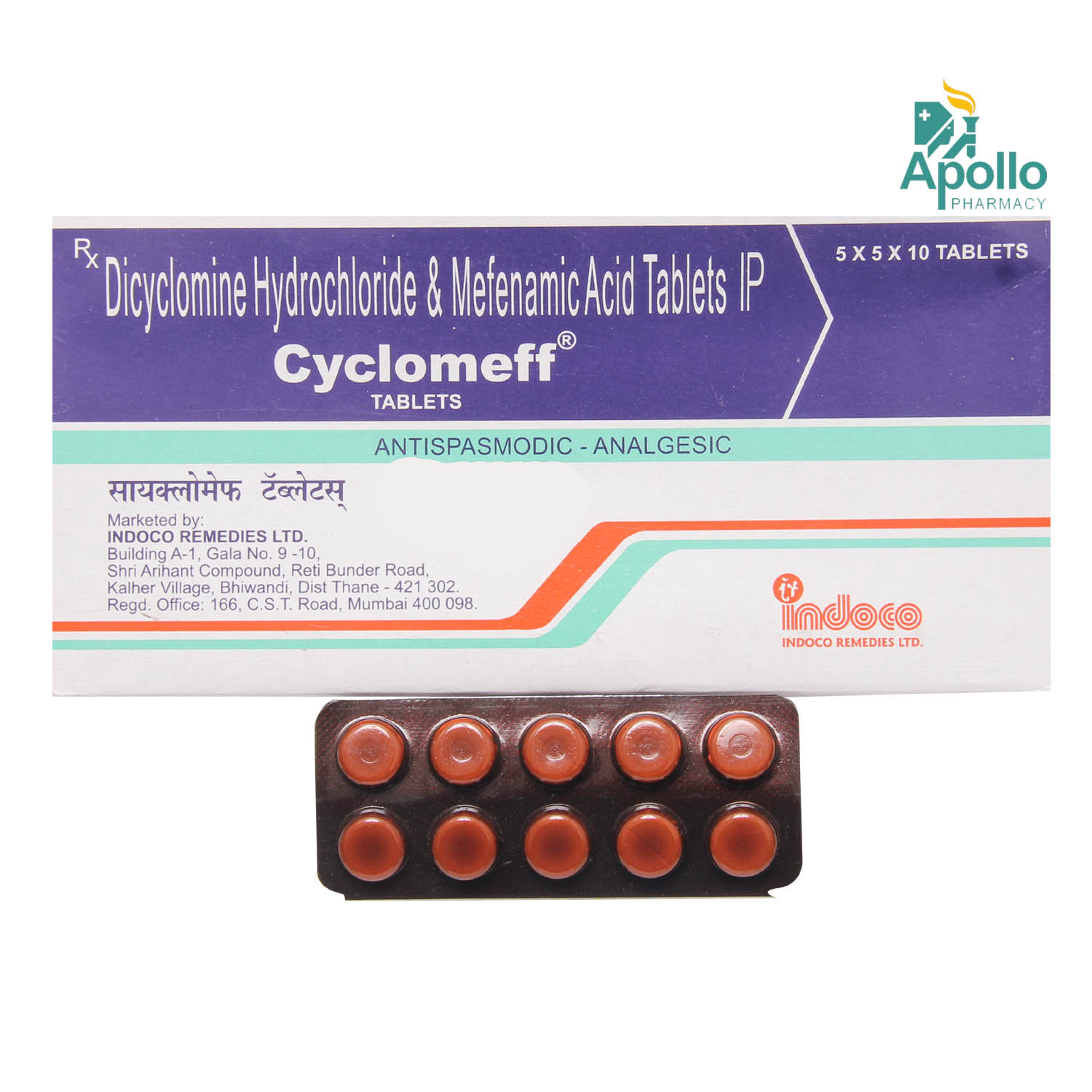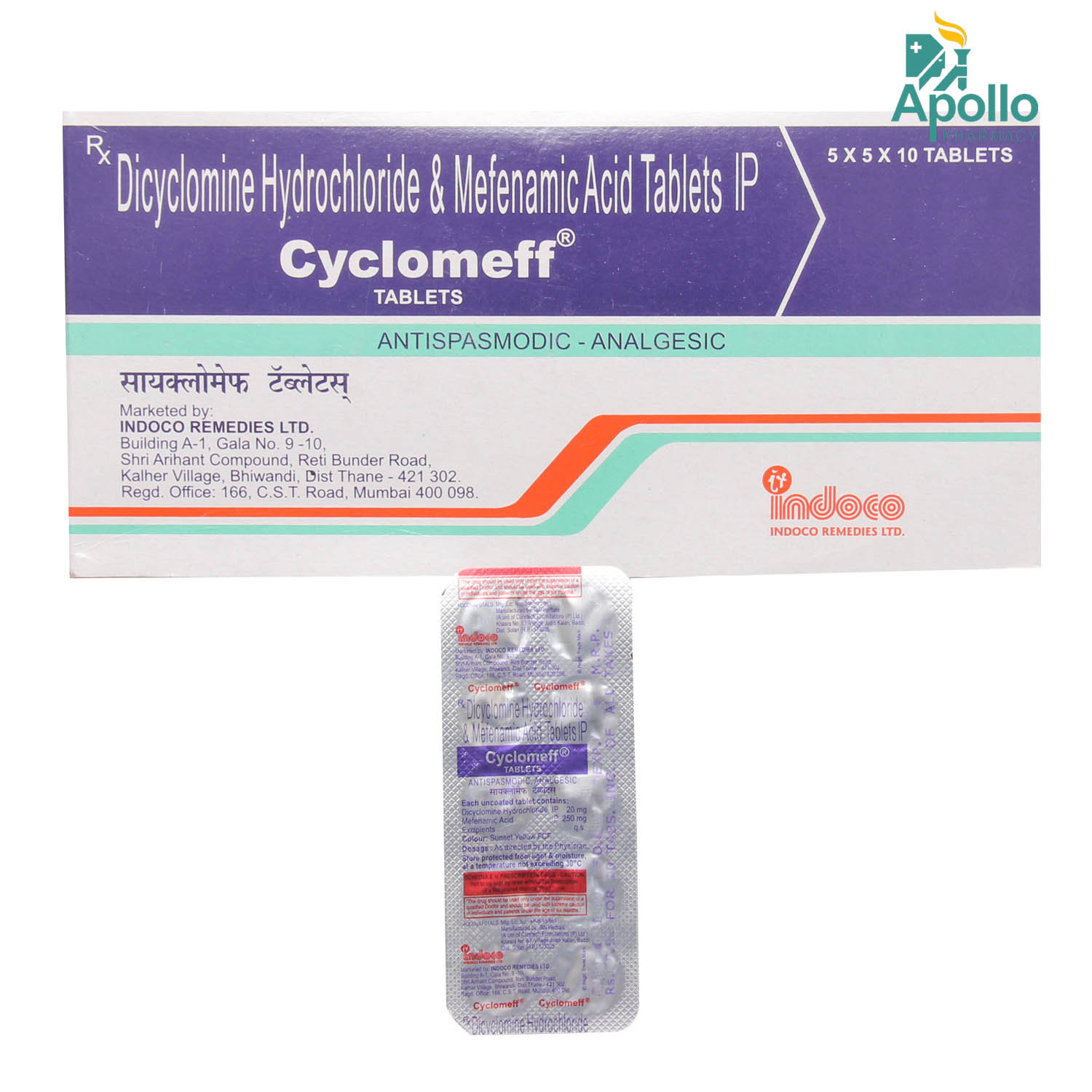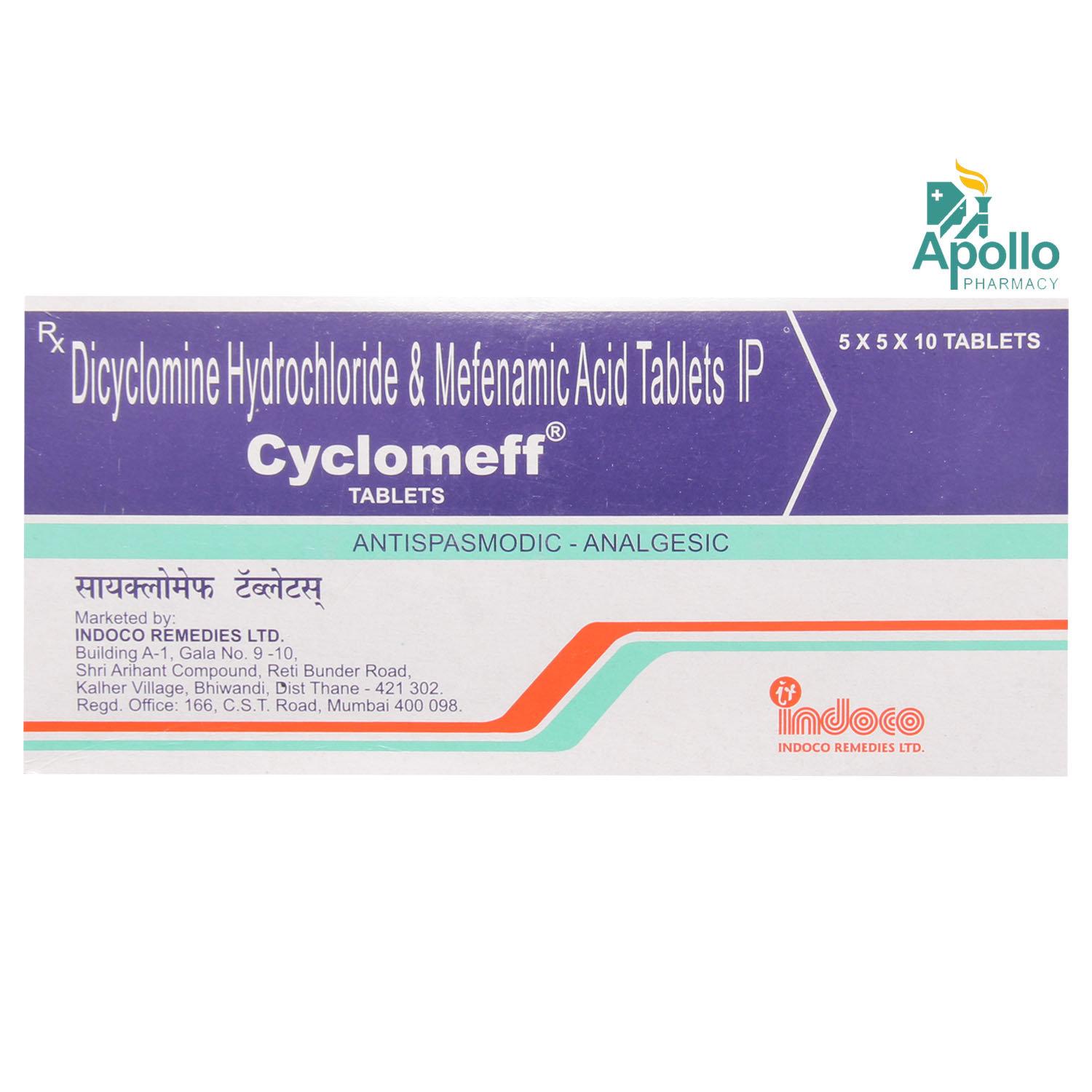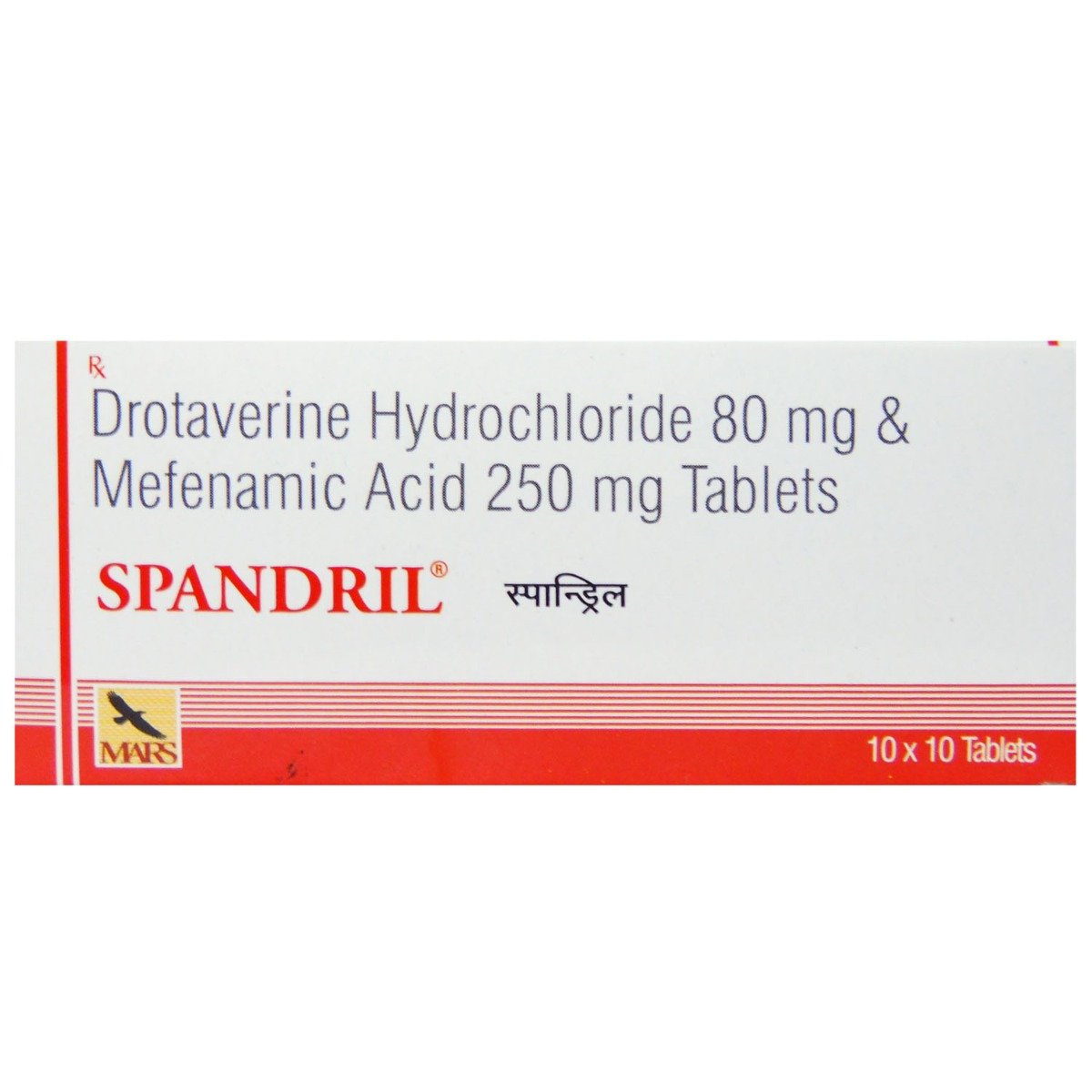Cyclomeff Tablet 10's
MRP ₹59.5
(Inclusive of all Taxes)
₹8.9 Cashback (15%)
Provide Delivery Location
Online payment accepted
 Prescription drug
Prescription drugWhats That
Composition :
Manufacturer/Marketer :
Consume Type :
Expires on or after :
Return Policy :
About Cyclomeff Tablet
Cyclomeff Tablet is a combination medicine used to treat abdominal pain, dysmenorrhea (period pain), and colicky pain. Abdominal (tummy) pain occurs between the chest and pelvic region (below the belly button and leg). Menstrual cramps, also known as dysmenorrhea, are characterised by cramps and pain during menstruation. Colic is a form of pain that starts and stops abruptly.
Cyclomeff Tablet is a combination of two drugs: Dicyclomine (anti-spasmodic) and Mefenamic acid (NSAID). Dicyclomine works by relieving contractions associated with the smooth muscles of the abdomen. Mefenamic acid works by blocking the effect of chemical messengers called prostaglandins. This helps reduces mild to moderate pain and inflammation at the injured or damaged site. Together, Cyclomeff Tablet helps in relieving pain.
You are advised to take Cyclomeff Tablet for as long as your doctor has prescribed it for you depending on your medical condition. In some cases, Cyclomeff Tablet may cause common side effects such as nausea, vomiting, diarrhoea, dry mouth, and weakness. Most of these side-effects do not require medical attention and will resolve gradually over time. However, you are advised to talk to your doctor if you experience these side-effects persistently.
Consult your doctor if you are pregnant or breastfeeding. Cyclomeff Tablet may cause dizziness and drowsiness, so drive with caution. Cyclomeff Tablet is not recommended for children as safety and efficacy have not been established. Avoid consuming alcohol with Cyclomeff Tablet as it could lead to increased drowsiness and dizziness, it might also increase the risk of stomach bleeding. Keep your doctor informed about your health condition and medicines to rule out any side-effects/interactions.
Uses of Cyclomeff Tablet
Directions for Use
Key Benefits
Cyclomeff Tablet is a combination of two drugs, namely: Dicyclomine (anti-spasmodic) and Mefenamic acid (NSAID). Cyclomeff Tablet is used to treat abdominal pain, dysmenorrhea (period pain), and colicky pain. Dicyclomine works by relieving contractions associated with the smooth muscles of the abdomen. Mefenamic acid works by blocking the effect of chemical messengers called prostaglandins. This helps reduce mild to moderate pain and inflammation at the injured or damaged site. Together, Cyclomeff Tablet helps in relieving pain.
Storage
- Inform your doctor about dry mouth symptoms. They may adjust your medication regimen or prescribe additional medications to manage symptoms.
- Drink plenty of water throughout the day to help keep your mouth moist and alleviate dry mouth symptoms.
- Chew sugar-free gum or candies to increase saliva production and keep your mouth moisturized.
- Use saliva substitutes, such as mouthwashes or sprays, only if your doctor advises them to help moisturize your mouth and alleviate dry mouth symptoms.
- Avoid consuming smoking, alcohol, spicy or acidic foods, and other irritants that may aggravate dry mouth symptoms.
- Schedule regular dental check-ups to keep track of your oral health and handle any dry mouth issues as they arise.
- Inform your doctor about the nausea and discuss possible alternatives to the medication or adjustments to the dosage.
- Divide your daily food intake into smaller, more frequent meals to reduce nausea.
- Opt for bland, easily digestible foods like crackers, toast, plain rice, bananas, and applesauce.
- Avoid certain foods that can trigger nausea, such as fatty, greasy, spicy, and smelly foods.
- Drink plenty of fluids, such as water, clear broth, or electrolyte-rich beverages like coconut water or sports drinks.
- Use ginger (tea, ale, or candies) to help relieve nausea.
- Get adequate rest and also avoid strenuous activities that can worsen nausea.
- Talk to your doctor about taking anti-nausea medication if your nausea is severe.
- Record when your nausea occurs, what triggers it, and what provides relief to help you identify patterns and manage your symptoms more effectively.
- Inform your doctor about dizziness symptoms. They may adjust your medication regimen or prescribe additional medications to manage symptoms.
- Follow your doctor's instructions for taking medication, and take it at the same time every day to minimize dizziness.
- When standing up, do so slowly and carefully to avoid sudden dizziness.
- Avoid making sudden movements, such as turning or bending quickly, which can exacerbate dizziness.
- Drink plenty of water throughout the day to stay hydrated and help alleviate dizziness symptoms.
- If you're feeling dizzy, sit or lie down and rest until the dizziness passes.
- Track when dizziness occurs and any factors that may trigger it, and share this information with your doctor to help manage symptoms.
- Avoid driving or operating machinery or activities that require high focus until you know how the medication affects you.
- Maintain a fixed sleeping schedule, create a relaxing bedtime routine and ensure your sleeping space is comfortable to maximize your sleep quality.
- Limit alcohol and caffeine as these may worsen drowsiness and disturb sleep patterns.
- Drink plenty of water as it helps with alertness and keeps you hydrated and for overall well-being.
- Moderate physical activity can improve energy levels, but avoid intense workouts right before bedtime.
- Rest well; get enough sleep.
- Eat a balanced diet and drink enough water.
- Manage stress with yoga and meditation.
- Limit alcohol and caffeine.
- Physical activities like walking or jogging might help boost energy and make you feel less tired.
- Tell your doctor immediately if you experience symptoms of Nervousness, such as anxiety, jitteriness, or an increased heart rate, after taking medication or adjusting your medication regimen.
- Your doctor may adjust your medication regimen to alleviate symptoms of Nervousness. This can include switching to a different medication, reducing the dosage, or temporarily stopping the medication. Your doctor may also recommend alternative techniques like relaxation, mindfulness meditation, or journaling. These techniques can help reduce anxiety and Nervousness.
- Practice stress-reducing techniques, such as deep breathing exercises, yoga, or journaling, to help manage Nervousness.
- Engage in regular physical activity, such as walking or jogging, to help reduce anxiety and improve mood.
- Your doctor may advise considering cognitive-behavioural therapy (CBT) or other forms of talk therapy to address underlying anxiety or Nervousness.
- You should maintain regular follow-up appointments with your doctor to monitor nervousness symptoms, adjust treatment plans as needed, and discuss any concerns or questions.
Drug Warnings
Do not take Cyclomeff Tablet if you are allergic to any of its contents, if you have severe heart failure, or have suffered bleeding problems such as bleeding from the stomach or bowels while taking any painkillers. Inform your doctor if you have/had asthma, glaucoma, myasthenia gravis, high blood pressure, inflammatory bowel disease, paralytic ileus, intestinal atony, heart, kidney, or liver problems. Consult your doctor if you are pregnant or breastfeeding. Cyclomeff Tablet may cause dizziness and drowsiness, so drive only if you are alert. Cyclomeff Tablet should not be given to children as safety has not been established. Avoid consuming alcohol with Cyclomeff Tablet as it could lead to increased drowsiness and can increase the risk of stomach bleeding. Stop taking Cyclomeff Tablet and consult your doctor immediately if you have stomach pain or any signs of bleeding in the intestine or stomach, such as blood in stools. Do not take any other NSAIDs for pain relief along with Cyclomeff Tablet unless prescribed.
Drug-Drug Interactions
Drug-Drug Interactions
Login/Sign Up
Coadministration of Cyclomeff Tablet with Ketorolac can increase the risk or severity of gastric bleeding and ulcers.
How to manage the interaction:
Taking Cyclomeff Tablet with Ketorolac together can result in an interaction, it can be taken if your doctor has advised it. However, if you notice any unusual bleeding or bruising, other signs of bleeding, dizziness, lightheadedness, red or black tarry stools, coughing up or vomiting blood, severe headache, and weakness, you should contact a doctor immediately. Do not stop using any medications without talking to a doctor.
Co-administration of Cyclomeff Tablet with Meloxicam together can increase the risk or severity of bleeding.
How to manage the interaction:
Taking Cyclomeff Tablet with Meloxicam together is generally avoided as it can result in an interaction, it can be taken if a doctor has advised it. However, if you notice any unusual bleeding or bruising, other signs of bleeding, dizziness, lightheadedness, red or black tarry stools, coughing up or vomiting blood, severe headache, and weakness, you should contact a doctor immediately. Do not stop using any medications without talking a doctor.
Taking Cyclomeff Tablet and Potassium citrate together can increase the risk of stomach ulcers, bleeding, and gastrointestinal injury.
How to manage the interaction:
Taking Cyclomeff Tablet with Potassium citrate is not recommended, as it may lead to an interaction, it can be taken if prescribed by the doctor. However, if you experience severe stomach pain, bloating, sudden lightheadedness or dizziness, nausea, vomiting (especially with blood), decreased hunger, or dark, tarry stools, consult the doctor immediately. Do not discontinue any medications without a doctor's advice.
Co-administration of Pramlintide with Cyclomeff Tablet can increase the risk of reduced gastrointestinal movement.
How to manage the interaction:
Taking Cyclomeff Tablet with Pramlintide is not recommended, please consult your doctor before taking it. Do not discontinue the medication without consulting a doctor.
Co-administration of Cyclomeff Tablet with Potassium chloride can increase the risk of stomach ulcers.
How to manage the interaction:
Taking Cyclomeff Tablet with Potassium chloride is not recommended, as it can lead to an interaction, it can be taken if a doctor has prescribed it. However, if you experience severe stomach pain, bloating, sudden lightheadedness or dizziness, nausea, vomiting (especially with blood), decreased hunger, dark, tarry stools, consult the doctor immediately. Do not discontinue the medication without consulting a doctor.
Co-administration of Cyclomeff Tablet with Flurbiprofen can increase the risk or severity of gastric bleeding, ulceration, and rarely, perforation leading to serious blood loss.
How to manage the interaction:
Taking Cyclomeff Tablet with Flurbiprofen together can result in an interaction, it can be taken if your doctor has advised it. However, if you notice any symptoms of dizziness, lightheadedness, unusual bleeding or bruising, red or black tarry stools, coughing up or vomiting blood, severe headache, and weakness, you should contact a doctor immediately. Do not stop using any medications without talking to a doctor.
Taking Human immunoglobulin with Cyclomeff Tablet, may raise the risk of kidney problems.
How to manage the interaction:
There may be a possibility of interaction between Human immunoglobulin and Cyclomeff Tablet, but it can be taken if prescribed by a doctor. However, if you experience nausea, vomiting, loss of appetite, increased or decreased urination, sudden weight gain or loss, fluid retention, swelling, shortness of breath, muscle cramps, tiredness, weakness, dizziness, confusion, or an irregular heart rhythm, consult a doctor. Do not discontinue any medications without consulting a doctor.
Teriflunomide may cause liver damage and taking it with Cyclomeff Tablet may increase that risk.
How to manage the interaction:
Although taking Cyclomeff Tablet and Teriflunomide together can cause an interaction, it can be taken if your doctor has suggested it. If you have any of these symptoms, it's important to contact your doctor right away - liver problems, fever, feeling cold, pain in your joints, swelling, bruises, rash, itchy skin, not feeling hungry, feeling tired, feeling sick, throwing up, dark urine, or bleeding. Do not discontinue any medications without consulting a doctor.
Coadministration of Cyclomeff Tablet with Deferasirox can increase the risk or severity of gastric bleeding.
How to manage the interaction:
Taking Cyclomeff Tablet with Deferasirox together can result in an interaction, it can be taken if your doctor has advised it. However, if you notice any symptoms of increased or decreased urination, fluid retention, swelling, shortness of breath, muscle cramps, tiredness, weakness, dizziness, confusion, and irregular heart rhythm, you should contact a doctor immediately. Do not stop using any medications without talking to a doctor.
The combined use of Cyclomeff Tablet and Tenofovir alafenamide can increase the risk of kidney problems.
How to manage the interaction:
Taking Cyclomeff Tablet and Tenofovir alafenamide together can lead to an interaction, it can be taken if advised by your doctor. However, if you experience any symptoms like nausea, vomiting, loss of appetite, increased or decreased urination, sudden weight gain or weight loss, fluid retention, swelling, shortness of breath, bone pain, muscle cramps, tiredness, weakness, dizziness, confusion, and irregular heart rhythm, contact a doctor immediately. Do not discontinue any medications without consulting a doctor.
Drug-Food Interactions
Drug-Food Interactions
Login/Sign Up
Diet & Lifestyle Advise
- Exercising regularly helps in muscle stretching so that they are less likely to spasm, tear and sprain. Mild exercises such as jogging and walking are helpful for muscle stretching.
- Massages can also be helpful.
- Avoid freezing and hot temperatures.
- Avoid wearing tight-fitting clothes, instead, wear loose garments.
- Rest well, and get plenty of sleep.
- To avoid developing pressure sores, change your position every two hours.
- Hot or cold therapy can help treat muscle spasms. Apply an ice-pack or hot-pack on the muscle for 15-20minutes.
- Stay hydrated, drink plenty of water.
Side Effects of Cyclomeff Tablet
- Nausea
- Vomiting
- Diarrhoea
- Dizziness
- Headache
- Dry mouth
- Weakness
- Nervousness
- Loss of appetite
Habit Forming
Therapeutic Class
All Substitutes & Brand Comparisons
RX
Out of StockDimef 20mg/250mg Tablet
₹14
(₹1.26 per unit)
76% CHEAPERRX
Out of StockAcispas 20mg/250mg Tablet
₹19
(₹1.71 per unit)
68% CHEAPERRX
Out of StockDicet M 20mg/250mg Tablet
₹19.9
(₹1.79 per unit)
66% CHEAPER
Author Details
We provide you with authentic, trustworthy and relevant information
Drug-Diseases Interactions
Drug-Diseases Interactions
Login/Sign Up
FAQs
Drug-Drug Interactions Checker List
- ASPIRIN
- FUROSEMIDE
- LITHIUM
- QUINIDINE
- PHENOTHIAZINE
- METHOTREXATE
- WARFARIN
- CLOPIDOGREL
- DIGOXIN
- GLIMEPIRIDE
- GLICLAZIDE
- GLIBENCLAMIDE
- GENTAMICIN
- TOBRAMYCIN
- AMIKACIN
- CYCLOSPORINE
- MIFEPRESTONE
- TACROLIMUS
- ZIDOVUDINE
- METOCLOPRAMIDE
Special Advise
- Cyclomeff Tablet may prolong prothrombin time (blood test to measure blood clotting time). Therefore, frequent monitoring of prothrombin time is advised while taking Cyclomeff Tablet .
- Cyclomeff Tablet may cause a false-positive reaction for urinary bile test. Inform the person doing the test that you are taking Cyclomeff Tablet .
Disease/Condition Glossary
Abdominal pain and cramps: Abdominal pain occurs between the chest and pelvic region, generally known as stomach or tummy pain. Pain is a symptom triggered by the nervous system, causing uncomfortable sensations in the body. Muscle spasm is the sudden involuntary contractions of the muscle, which can be painful and uncomfortable. When the nerve impulses that control the muscle movements are damaged or interrupted, it could lead to muscle spasms. The common causes of abdominal pain include inflammation, infections, intestinal disorders, and obstruction/blockage.
Dysmenorrhea: Menstrual cramps, also known as dysmenorrhea, is characterised by cramps and pain during menstruation due to heavy flow. Pain, cramps, and discomfort during periods are normal. However, excessive pain during periods is not normal and requires medication. Menstrual cramps cause throbbing, aching pain in the lower belly that occurs before or during the periods.

Have a query?
Alcohol
Safe if prescribed
Avoid consumption of alcohol while taking Cyclomeff Tablet as it may cause increased drowsiness. It can also increase the risk of stomach bleeding.
Pregnancy
Consult your doctor
Please consult your doctor if you are pregnant or if you have any concerns regarding this; your doctor will prescribe only if the benefits outweigh the risks.
Breast Feeding
Consult your doctor
It is not recommended to breastfeed while taking Cyclomeff Tablet . Consult your doctor before taking Cyclomeff Tablet if you are breastfeeding.
Driving
Safe if prescribed
Cyclomeff Tablet may cause drowsiness and dizziness. Do not drive or operate machinery unless you are alert.
Liver
Consult your doctor
Dose adjustment may be needed in patients with liver impairment. Please consult your doctor if you have a liver impairment or any concerns regarding this.
Kidney
Consult your doctor
Cyclomeff Tablet should not be used in patients with renal disease. Please consult your doctor if you have kidney impairment or any concerns regarding this.
Children
Safe if prescribed
Cyclomeff Tablet is not recommended for children as safety and effectiveness were not established.











_0.jpg?tr=q-85)

